Taxation Law Assignment: Improving Tax Compliance in Shared Economy
VerifiedAdded on 2023/03/20
|10
|2744
|49
Essay
AI Summary
This essay delves into the complexities of taxation law in the context of the shared economy, specifically focusing on the compliance of providers such as Uber drivers, Airbnb hosts, Airtasker users, and Deliveroo drivers with Australian income tax laws. The essay begins by outlining the challenges faced by the Australian Taxation Office (ATO) in ensuring compliance, including the lack of clear definitions and the informal nature of shared economy activities. It explores the current arrangements, highlighting the difficulties in identifying and assessing the income of shared economy participants due to the absence of traditional employer-employee relationships and the potential for underreporting. The essay then examines the ATO's efforts to improve compliance, such as data-matching programs and information gathering from platforms like Uber and Airbnb. It also discusses recommendations for enhancing tax obligations, including the implementation of tax instalment regimes and improved reporting arrangements. The essay concludes by emphasizing the need for a comprehensive approach to address the challenges of taxation in the shared economy and ensure fair tax collection.
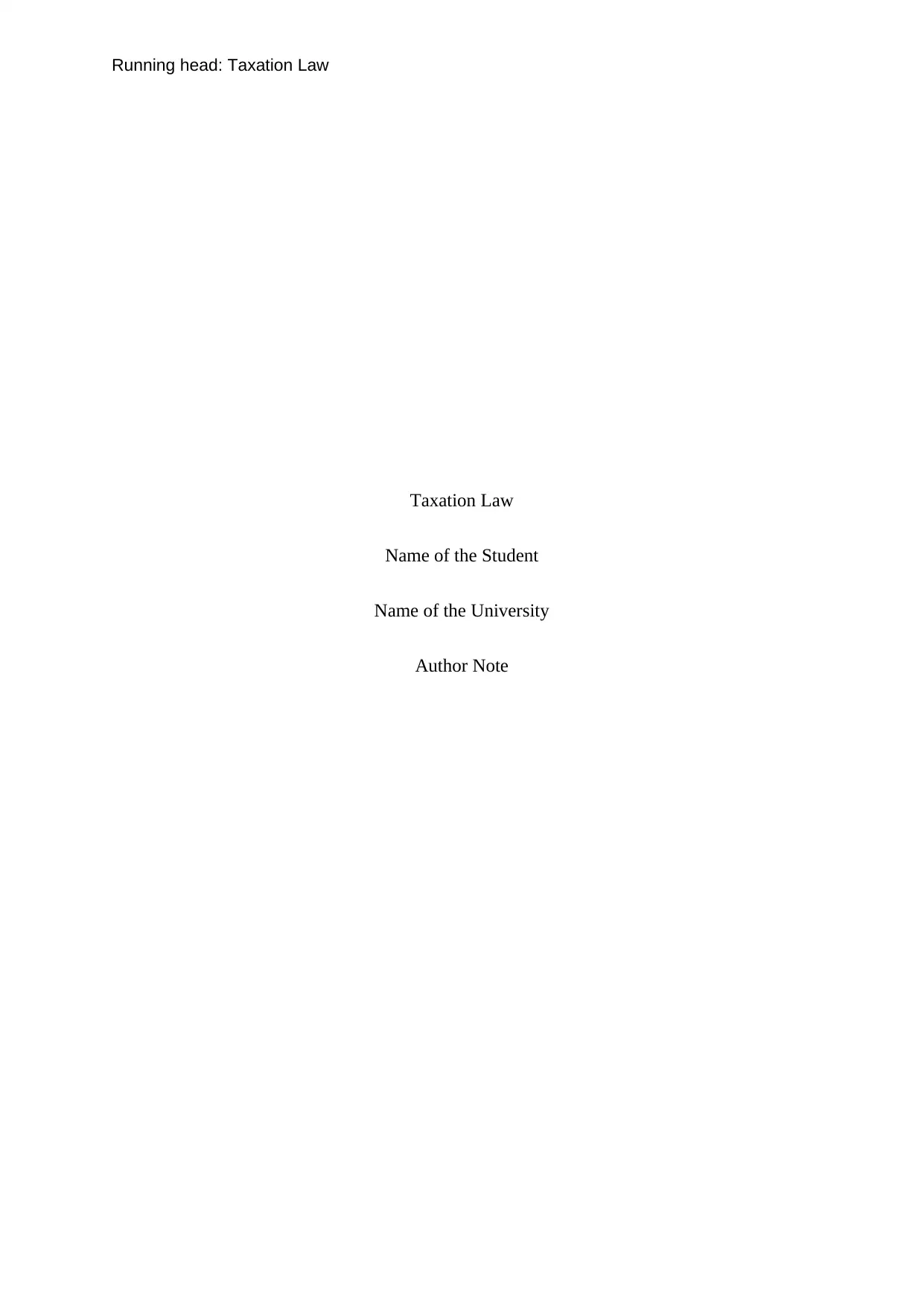
Running head: Taxation Law
Taxation Law
Name of the Student
Name of the University
Author Note
Taxation Law
Name of the Student
Name of the University
Author Note
Paraphrase This Document
Need a fresh take? Get an instant paraphrase of this document with our AI Paraphraser
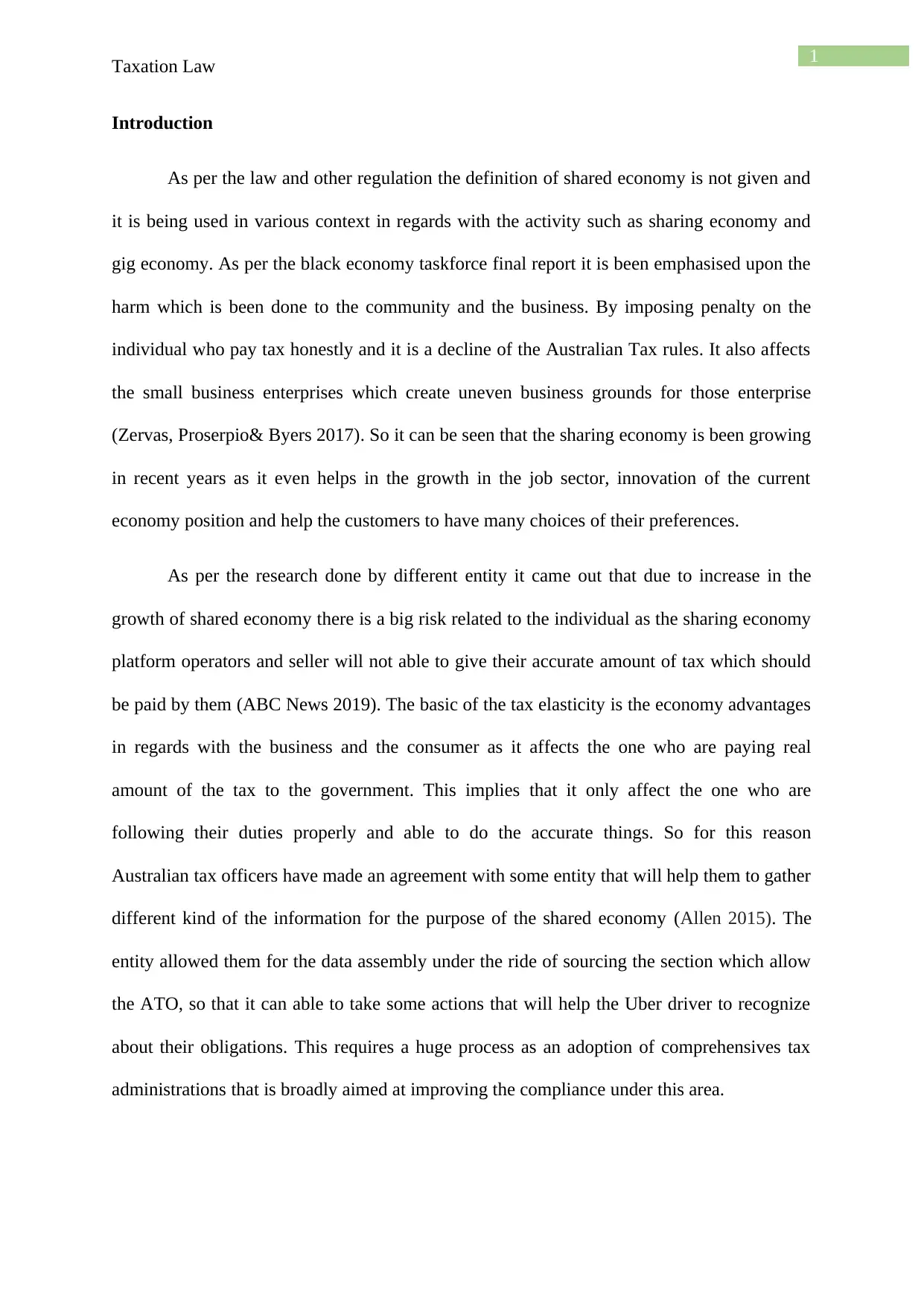
1
Taxation Law
Introduction
As per the law and other regulation the definition of shared economy is not given and
it is being used in various context in regards with the activity such as sharing economy and
gig economy. As per the black economy taskforce final report it is been emphasised upon the
harm which is been done to the community and the business. By imposing penalty on the
individual who pay tax honestly and it is a decline of the Australian Tax rules. It also affects
the small business enterprises which create uneven business grounds for those enterprise
(Zervas, Proserpio& Byers 2017). So it can be seen that the sharing economy is been growing
in recent years as it even helps in the growth in the job sector, innovation of the current
economy position and help the customers to have many choices of their preferences.
As per the research done by different entity it came out that due to increase in the
growth of shared economy there is a big risk related to the individual as the sharing economy
platform operators and seller will not able to give their accurate amount of tax which should
be paid by them (ABC News 2019). The basic of the tax elasticity is the economy advantages
in regards with the business and the consumer as it affects the one who are paying real
amount of the tax to the government. This implies that it only affect the one who are
following their duties properly and able to do the accurate things. So for this reason
Australian tax officers have made an agreement with some entity that will help them to gather
different kind of the information for the purpose of the shared economy (Allen 2015). The
entity allowed them for the data assembly under the ride of sourcing the section which allow
the ATO, so that it can able to take some actions that will help the Uber driver to recognize
about their obligations. This requires a huge process as an adoption of comprehensives tax
administrations that is broadly aimed at improving the compliance under this area.
Taxation Law
Introduction
As per the law and other regulation the definition of shared economy is not given and
it is being used in various context in regards with the activity such as sharing economy and
gig economy. As per the black economy taskforce final report it is been emphasised upon the
harm which is been done to the community and the business. By imposing penalty on the
individual who pay tax honestly and it is a decline of the Australian Tax rules. It also affects
the small business enterprises which create uneven business grounds for those enterprise
(Zervas, Proserpio& Byers 2017). So it can be seen that the sharing economy is been growing
in recent years as it even helps in the growth in the job sector, innovation of the current
economy position and help the customers to have many choices of their preferences.
As per the research done by different entity it came out that due to increase in the
growth of shared economy there is a big risk related to the individual as the sharing economy
platform operators and seller will not able to give their accurate amount of tax which should
be paid by them (ABC News 2019). The basic of the tax elasticity is the economy advantages
in regards with the business and the consumer as it affects the one who are paying real
amount of the tax to the government. This implies that it only affect the one who are
following their duties properly and able to do the accurate things. So for this reason
Australian tax officers have made an agreement with some entity that will help them to gather
different kind of the information for the purpose of the shared economy (Allen 2015). The
entity allowed them for the data assembly under the ride of sourcing the section which allow
the ATO, so that it can able to take some actions that will help the Uber driver to recognize
about their obligations. This requires a huge process as an adoption of comprehensives tax
administrations that is broadly aimed at improving the compliance under this area.
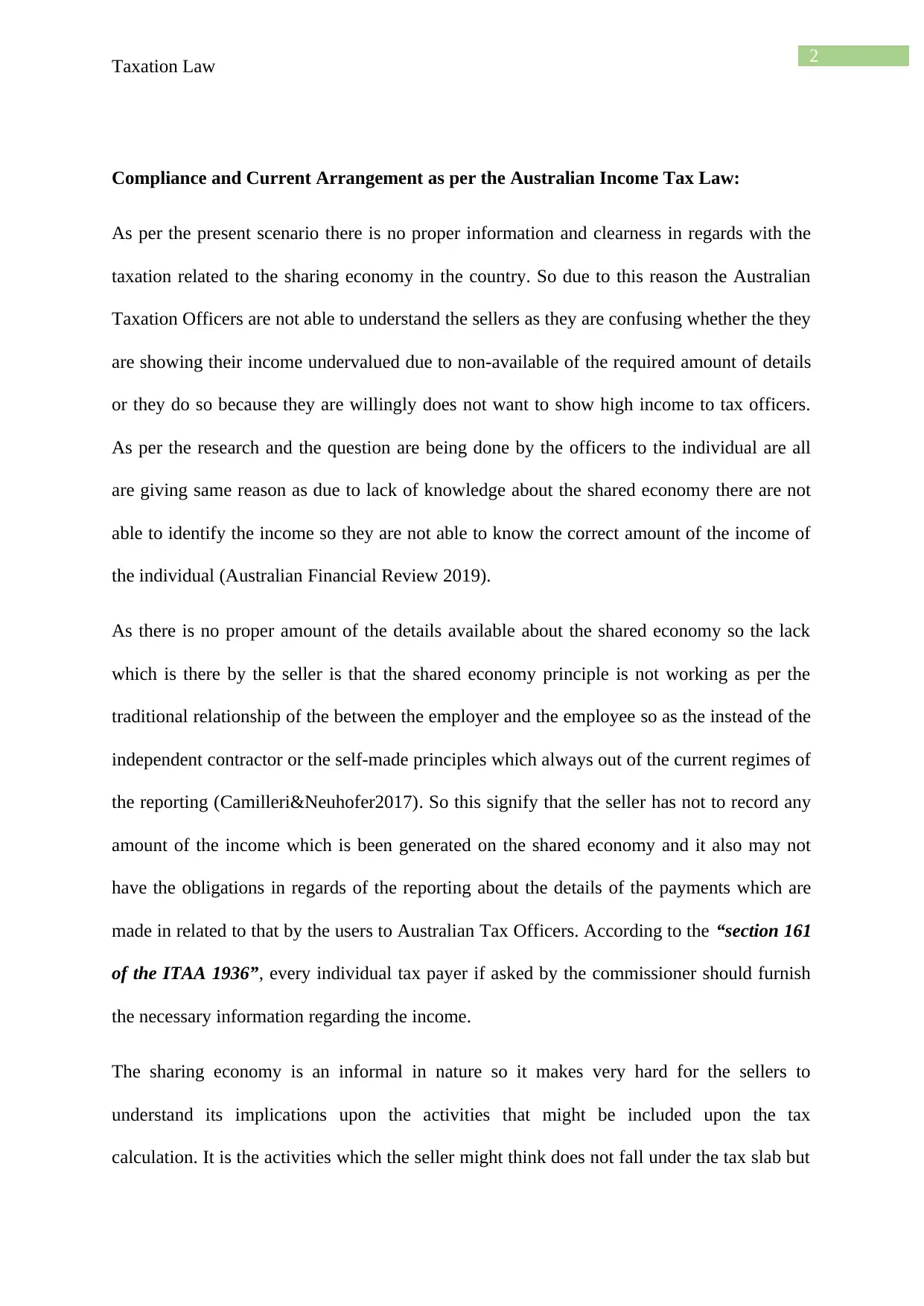
2
Taxation Law
Compliance and Current Arrangement as per the Australian Income Tax Law:
As per the present scenario there is no proper information and clearness in regards with the
taxation related to the sharing economy in the country. So due to this reason the Australian
Taxation Officers are not able to understand the sellers as they are confusing whether the they
are showing their income undervalued due to non-available of the required amount of details
or they do so because they are willingly does not want to show high income to tax officers.
As per the research and the question are being done by the officers to the individual are all
are giving same reason as due to lack of knowledge about the shared economy there are not
able to identify the income so they are not able to know the correct amount of the income of
the individual (Australian Financial Review 2019).
As there is no proper amount of the details available about the shared economy so the lack
which is there by the seller is that the shared economy principle is not working as per the
traditional relationship of the between the employer and the employee so as the instead of the
independent contractor or the self-made principles which always out of the current regimes of
the reporting (Camilleri&Neuhofer2017). So this signify that the seller has not to record any
amount of the income which is been generated on the shared economy and it also may not
have the obligations in regards of the reporting about the details of the payments which are
made in related to that by the users to Australian Tax Officers. According to the “section 161
of the ITAA 1936”, every individual tax payer if asked by the commissioner should furnish
the necessary information regarding the income.
The sharing economy is an informal in nature so it makes very hard for the sellers to
understand its implications upon the activities that might be included upon the tax
calculation. It is the activities which the seller might think does not fall under the tax slab but
Taxation Law
Compliance and Current Arrangement as per the Australian Income Tax Law:
As per the present scenario there is no proper information and clearness in regards with the
taxation related to the sharing economy in the country. So due to this reason the Australian
Taxation Officers are not able to understand the sellers as they are confusing whether the they
are showing their income undervalued due to non-available of the required amount of details
or they do so because they are willingly does not want to show high income to tax officers.
As per the research and the question are being done by the officers to the individual are all
are giving same reason as due to lack of knowledge about the shared economy there are not
able to identify the income so they are not able to know the correct amount of the income of
the individual (Australian Financial Review 2019).
As there is no proper amount of the details available about the shared economy so the lack
which is there by the seller is that the shared economy principle is not working as per the
traditional relationship of the between the employer and the employee so as the instead of the
independent contractor or the self-made principles which always out of the current regimes of
the reporting (Camilleri&Neuhofer2017). So this signify that the seller has not to record any
amount of the income which is been generated on the shared economy and it also may not
have the obligations in regards of the reporting about the details of the payments which are
made in related to that by the users to Australian Tax Officers. According to the “section 161
of the ITAA 1936”, every individual tax payer if asked by the commissioner should furnish
the necessary information regarding the income.
The sharing economy is an informal in nature so it makes very hard for the sellers to
understand its implications upon the activities that might be included upon the tax
calculation. It is the activities which the seller might think does not fall under the tax slab but
⊘ This is a preview!⊘
Do you want full access?
Subscribe today to unlock all pages.

Trusted by 1+ million students worldwide
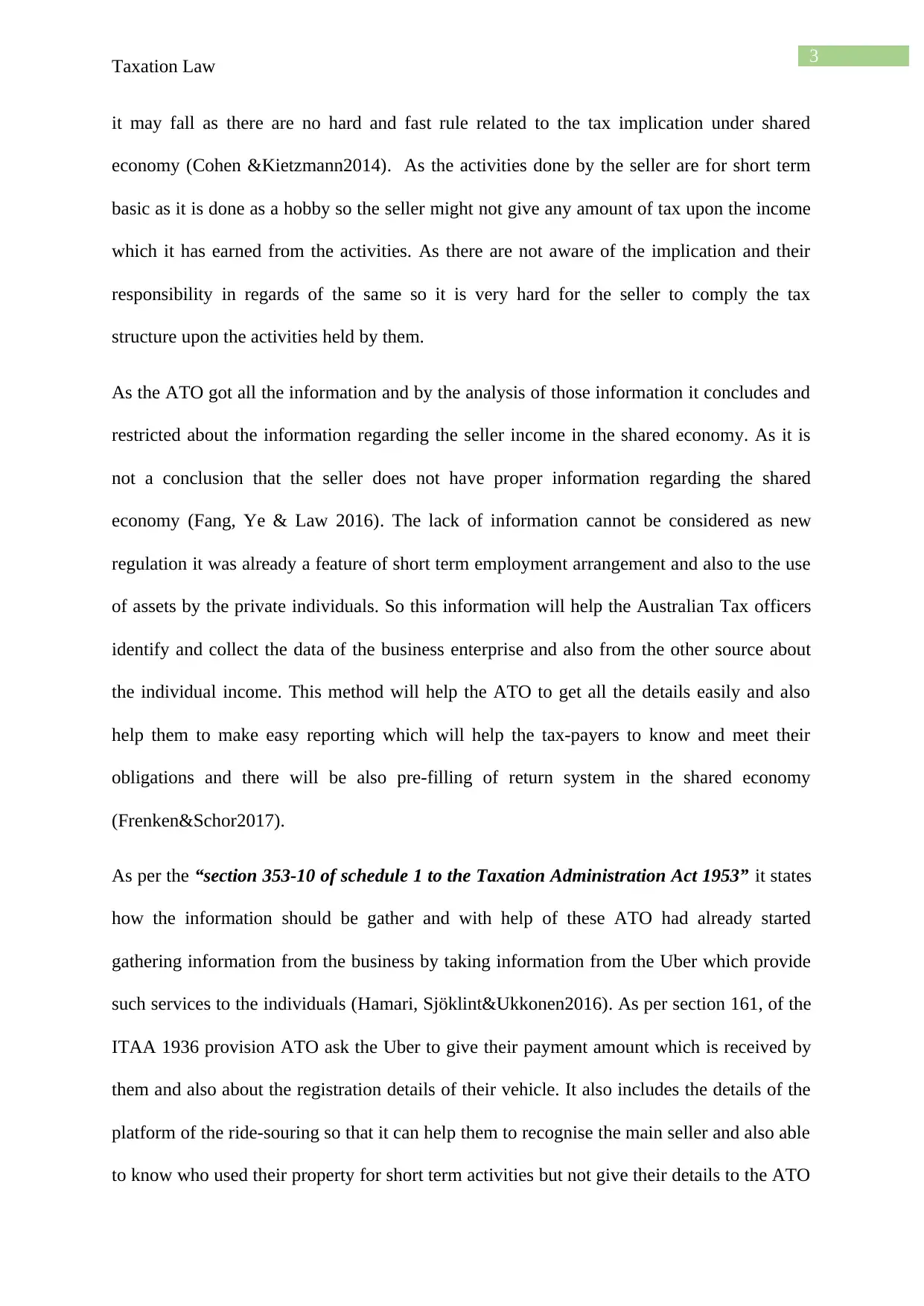
3
Taxation Law
it may fall as there are no hard and fast rule related to the tax implication under shared
economy (Cohen &Kietzmann2014). As the activities done by the seller are for short term
basic as it is done as a hobby so the seller might not give any amount of tax upon the income
which it has earned from the activities. As there are not aware of the implication and their
responsibility in regards of the same so it is very hard for the seller to comply the tax
structure upon the activities held by them.
As the ATO got all the information and by the analysis of those information it concludes and
restricted about the information regarding the seller income in the shared economy. As it is
not a conclusion that the seller does not have proper information regarding the shared
economy (Fang, Ye & Law 2016). The lack of information cannot be considered as new
regulation it was already a feature of short term employment arrangement and also to the use
of assets by the private individuals. So this information will help the Australian Tax officers
identify and collect the data of the business enterprise and also from the other source about
the individual income. This method will help the ATO to get all the details easily and also
help them to make easy reporting which will help the tax-payers to know and meet their
obligations and there will be also pre-filling of return system in the shared economy
(Frenken&Schor2017).
As per the “section 353-10 of schedule 1 to the Taxation Administration Act 1953” it states
how the information should be gather and with help of these ATO had already started
gathering information from the business by taking information from the Uber which provide
such services to the individuals (Hamari, Sjöklint&Ukkonen2016). As per section 161, of the
ITAA 1936 provision ATO ask the Uber to give their payment amount which is received by
them and also about the registration details of their vehicle. It also includes the details of the
platform of the ride-souring so that it can help them to recognise the main seller and also able
to know who used their property for short term activities but not give their details to the ATO
Taxation Law
it may fall as there are no hard and fast rule related to the tax implication under shared
economy (Cohen &Kietzmann2014). As the activities done by the seller are for short term
basic as it is done as a hobby so the seller might not give any amount of tax upon the income
which it has earned from the activities. As there are not aware of the implication and their
responsibility in regards of the same so it is very hard for the seller to comply the tax
structure upon the activities held by them.
As the ATO got all the information and by the analysis of those information it concludes and
restricted about the information regarding the seller income in the shared economy. As it is
not a conclusion that the seller does not have proper information regarding the shared
economy (Fang, Ye & Law 2016). The lack of information cannot be considered as new
regulation it was already a feature of short term employment arrangement and also to the use
of assets by the private individuals. So this information will help the Australian Tax officers
identify and collect the data of the business enterprise and also from the other source about
the individual income. This method will help the ATO to get all the details easily and also
help them to make easy reporting which will help the tax-payers to know and meet their
obligations and there will be also pre-filling of return system in the shared economy
(Frenken&Schor2017).
As per the “section 353-10 of schedule 1 to the Taxation Administration Act 1953” it states
how the information should be gather and with help of these ATO had already started
gathering information from the business by taking information from the Uber which provide
such services to the individuals (Hamari, Sjöklint&Ukkonen2016). As per section 161, of the
ITAA 1936 provision ATO ask the Uber to give their payment amount which is received by
them and also about the registration details of their vehicle. It also includes the details of the
platform of the ride-souring so that it can help them to recognise the main seller and also able
to know who used their property for short term activities but not give their details to the ATO
Paraphrase This Document
Need a fresh take? Get an instant paraphrase of this document with our AI Paraphraser
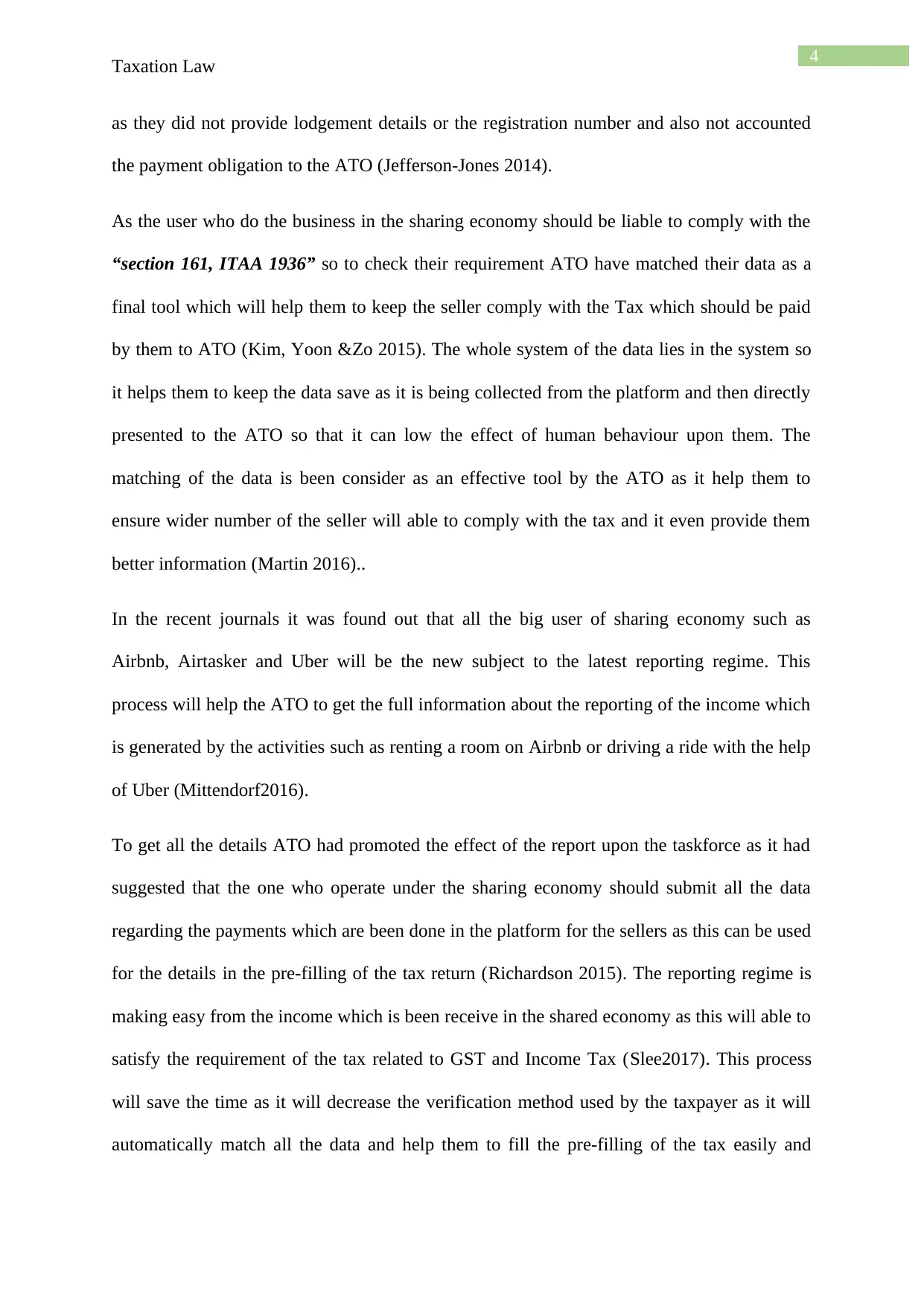
4
Taxation Law
as they did not provide lodgement details or the registration number and also not accounted
the payment obligation to the ATO (Jefferson-Jones 2014).
As the user who do the business in the sharing economy should be liable to comply with the
“section 161, ITAA 1936” so to check their requirement ATO have matched their data as a
final tool which will help them to keep the seller comply with the Tax which should be paid
by them to ATO (Kim, Yoon &Zo 2015). The whole system of the data lies in the system so
it helps them to keep the data save as it is being collected from the platform and then directly
presented to the ATO so that it can low the effect of human behaviour upon them. The
matching of the data is been consider as an effective tool by the ATO as it help them to
ensure wider number of the seller will able to comply with the tax and it even provide them
better information (Martin 2016)..
In the recent journals it was found out that all the big user of sharing economy such as
Airbnb, Airtasker and Uber will be the new subject to the latest reporting regime. This
process will help the ATO to get the full information about the reporting of the income which
is generated by the activities such as renting a room on Airbnb or driving a ride with the help
of Uber (Mittendorf2016).
To get all the details ATO had promoted the effect of the report upon the taskforce as it had
suggested that the one who operate under the sharing economy should submit all the data
regarding the payments which are been done in the platform for the sellers as this can be used
for the details in the pre-filling of the tax return (Richardson 2015). The reporting regime is
making easy from the income which is been receive in the shared economy as this will able to
satisfy the requirement of the tax related to GST and Income Tax (Slee2017). This process
will save the time as it will decrease the verification method used by the taxpayer as it will
automatically match all the data and help them to fill the pre-filling of the tax easily and
Taxation Law
as they did not provide lodgement details or the registration number and also not accounted
the payment obligation to the ATO (Jefferson-Jones 2014).
As the user who do the business in the sharing economy should be liable to comply with the
“section 161, ITAA 1936” so to check their requirement ATO have matched their data as a
final tool which will help them to keep the seller comply with the Tax which should be paid
by them to ATO (Kim, Yoon &Zo 2015). The whole system of the data lies in the system so
it helps them to keep the data save as it is being collected from the platform and then directly
presented to the ATO so that it can low the effect of human behaviour upon them. The
matching of the data is been consider as an effective tool by the ATO as it help them to
ensure wider number of the seller will able to comply with the tax and it even provide them
better information (Martin 2016)..
In the recent journals it was found out that all the big user of sharing economy such as
Airbnb, Airtasker and Uber will be the new subject to the latest reporting regime. This
process will help the ATO to get the full information about the reporting of the income which
is generated by the activities such as renting a room on Airbnb or driving a ride with the help
of Uber (Mittendorf2016).
To get all the details ATO had promoted the effect of the report upon the taskforce as it had
suggested that the one who operate under the sharing economy should submit all the data
regarding the payments which are been done in the platform for the sellers as this can be used
for the details in the pre-filling of the tax return (Richardson 2015). The reporting regime is
making easy from the income which is been receive in the shared economy as this will able to
satisfy the requirement of the tax related to GST and Income Tax (Slee2017). This process
will save the time as it will decrease the verification method used by the taxpayer as it will
automatically match all the data and help them to fill the pre-filling of the tax easily and
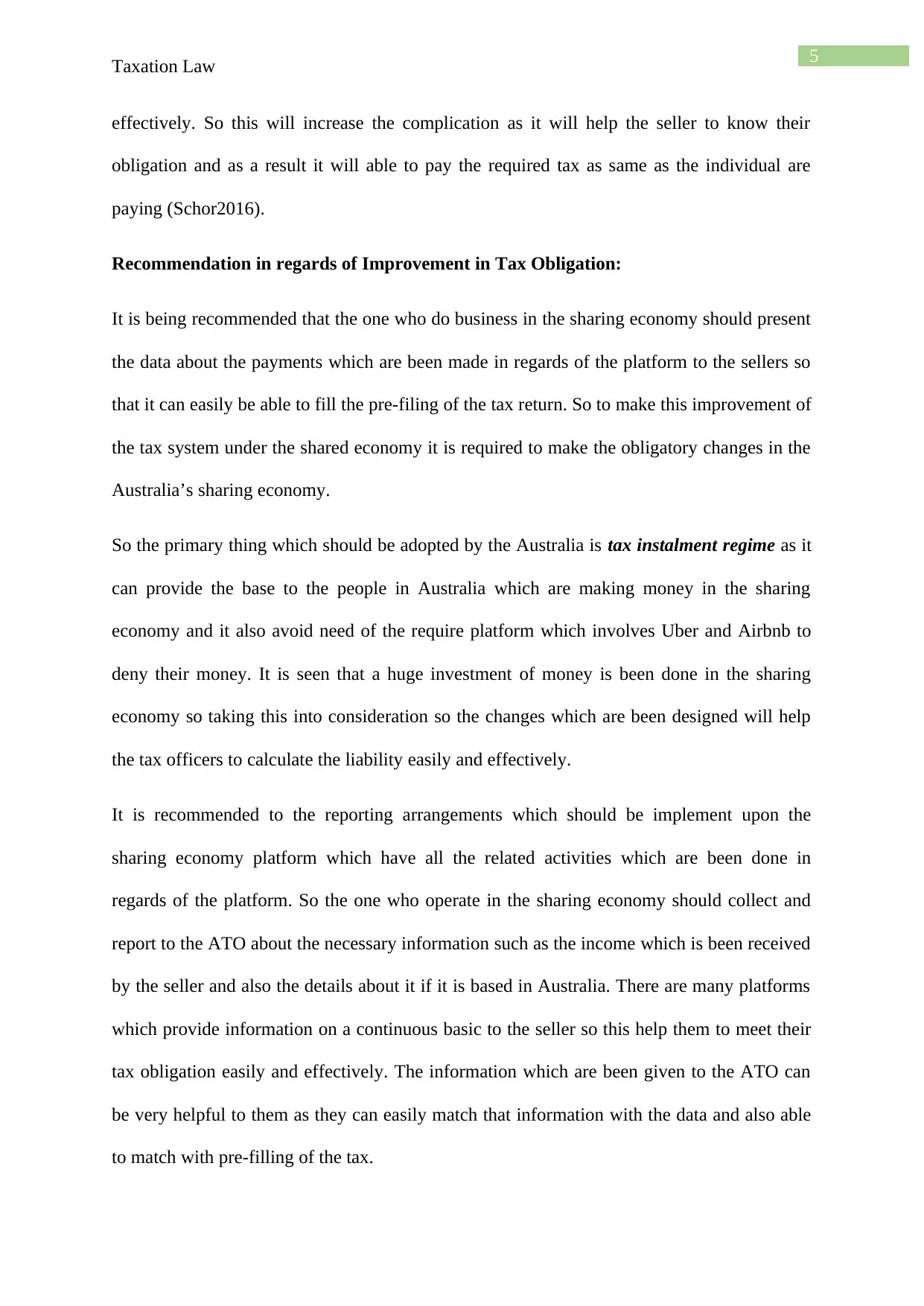
5
Taxation Law
effectively. So this will increase the complication as it will help the seller to know their
obligation and as a result it will able to pay the required tax as same as the individual are
paying (Schor2016).
Recommendation in regards of Improvement in Tax Obligation:
It is being recommended that the one who do business in the sharing economy should present
the data about the payments which are been made in regards of the platform to the sellers so
that it can easily be able to fill the pre-filing of the tax return. So to make this improvement of
the tax system under the shared economy it is required to make the obligatory changes in the
Australia’s sharing economy.
So the primary thing which should be adopted by the Australia is tax instalment regime as it
can provide the base to the people in Australia which are making money in the sharing
economy and it also avoid need of the require platform which involves Uber and Airbnb to
deny their money. It is seen that a huge investment of money is been done in the sharing
economy so taking this into consideration so the changes which are been designed will help
the tax officers to calculate the liability easily and effectively.
It is recommended to the reporting arrangements which should be implement upon the
sharing economy platform which have all the related activities which are been done in
regards of the platform. So the one who operate in the sharing economy should collect and
report to the ATO about the necessary information such as the income which is been received
by the seller and also the details about it if it is based in Australia. There are many platforms
which provide information on a continuous basic to the seller so this help them to meet their
tax obligation easily and effectively. The information which are been given to the ATO can
be very helpful to them as they can easily match that information with the data and also able
to match with pre-filling of the tax.
Taxation Law
effectively. So this will increase the complication as it will help the seller to know their
obligation and as a result it will able to pay the required tax as same as the individual are
paying (Schor2016).
Recommendation in regards of Improvement in Tax Obligation:
It is being recommended that the one who do business in the sharing economy should present
the data about the payments which are been made in regards of the platform to the sellers so
that it can easily be able to fill the pre-filing of the tax return. So to make this improvement of
the tax system under the shared economy it is required to make the obligatory changes in the
Australia’s sharing economy.
So the primary thing which should be adopted by the Australia is tax instalment regime as it
can provide the base to the people in Australia which are making money in the sharing
economy and it also avoid need of the require platform which involves Uber and Airbnb to
deny their money. It is seen that a huge investment of money is been done in the sharing
economy so taking this into consideration so the changes which are been designed will help
the tax officers to calculate the liability easily and effectively.
It is recommended to the reporting arrangements which should be implement upon the
sharing economy platform which have all the related activities which are been done in
regards of the platform. So the one who operate in the sharing economy should collect and
report to the ATO about the necessary information such as the income which is been received
by the seller and also the details about it if it is based in Australia. There are many platforms
which provide information on a continuous basic to the seller so this help them to meet their
tax obligation easily and effectively. The information which are been given to the ATO can
be very helpful to them as they can easily match that information with the data and also able
to match with pre-filling of the tax.
⊘ This is a preview!⊘
Do you want full access?
Subscribe today to unlock all pages.

Trusted by 1+ million students worldwide
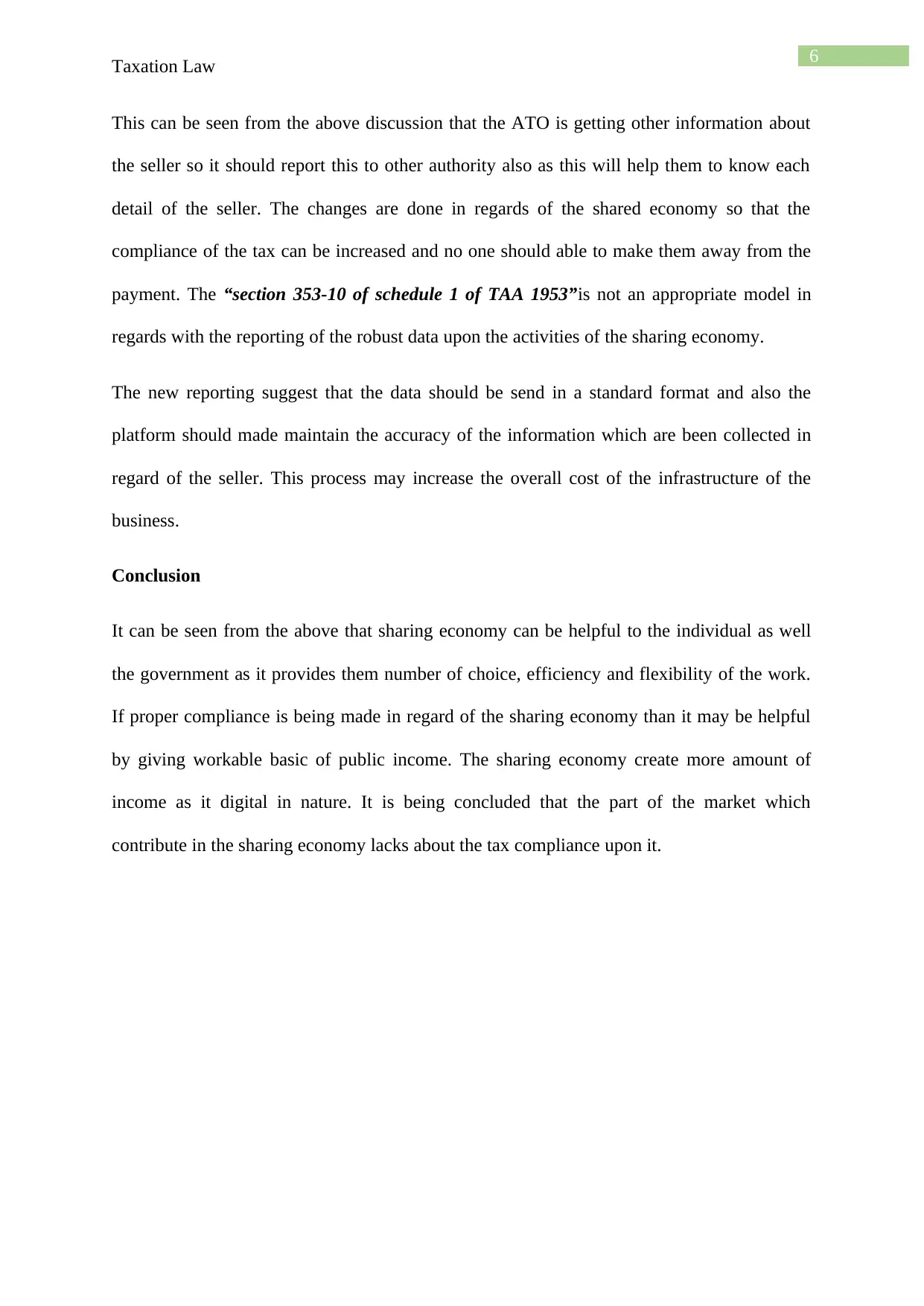
6
Taxation Law
This can be seen from the above discussion that the ATO is getting other information about
the seller so it should report this to other authority also as this will help them to know each
detail of the seller. The changes are done in regards of the shared economy so that the
compliance of the tax can be increased and no one should able to make them away from the
payment. The “section 353-10 of schedule 1 of TAA 1953”is not an appropriate model in
regards with the reporting of the robust data upon the activities of the sharing economy.
The new reporting suggest that the data should be send in a standard format and also the
platform should made maintain the accuracy of the information which are been collected in
regard of the seller. This process may increase the overall cost of the infrastructure of the
business.
Conclusion
It can be seen from the above that sharing economy can be helpful to the individual as well
the government as it provides them number of choice, efficiency and flexibility of the work.
If proper compliance is being made in regard of the sharing economy than it may be helpful
by giving workable basic of public income. The sharing economy create more amount of
income as it digital in nature. It is being concluded that the part of the market which
contribute in the sharing economy lacks about the tax compliance upon it.
Taxation Law
This can be seen from the above discussion that the ATO is getting other information about
the seller so it should report this to other authority also as this will help them to know each
detail of the seller. The changes are done in regards of the shared economy so that the
compliance of the tax can be increased and no one should able to make them away from the
payment. The “section 353-10 of schedule 1 of TAA 1953”is not an appropriate model in
regards with the reporting of the robust data upon the activities of the sharing economy.
The new reporting suggest that the data should be send in a standard format and also the
platform should made maintain the accuracy of the information which are been collected in
regard of the seller. This process may increase the overall cost of the infrastructure of the
business.
Conclusion
It can be seen from the above that sharing economy can be helpful to the individual as well
the government as it provides them number of choice, efficiency and flexibility of the work.
If proper compliance is being made in regard of the sharing economy than it may be helpful
by giving workable basic of public income. The sharing economy create more amount of
income as it digital in nature. It is being concluded that the part of the market which
contribute in the sharing economy lacks about the tax compliance upon it.
Paraphrase This Document
Need a fresh take? Get an instant paraphrase of this document with our AI Paraphraser
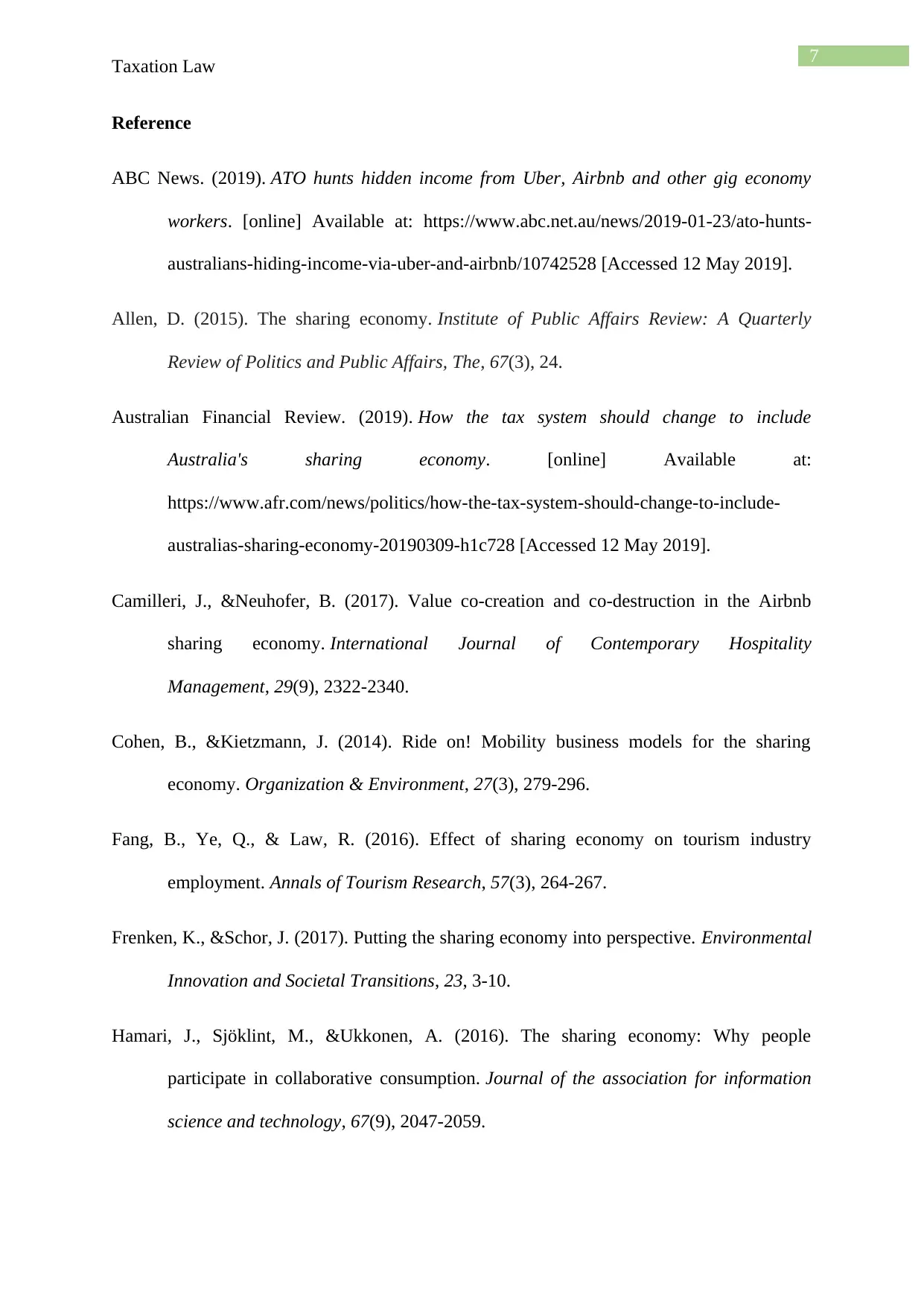
7
Taxation Law
Reference
ABC News. (2019). ATO hunts hidden income from Uber, Airbnb and other gig economy
workers. [online] Available at: https://www.abc.net.au/news/2019-01-23/ato-hunts-
australians-hiding-income-via-uber-and-airbnb/10742528 [Accessed 12 May 2019].
Allen, D. (2015). The sharing economy. Institute of Public Affairs Review: A Quarterly
Review of Politics and Public Affairs, The, 67(3), 24.
Australian Financial Review. (2019). How the tax system should change to include
Australia's sharing economy. [online] Available at:
https://www.afr.com/news/politics/how-the-tax-system-should-change-to-include-
australias-sharing-economy-20190309-h1c728 [Accessed 12 May 2019].
Camilleri, J., &Neuhofer, B. (2017). Value co-creation and co-destruction in the Airbnb
sharing economy. International Journal of Contemporary Hospitality
Management, 29(9), 2322-2340.
Cohen, B., &Kietzmann, J. (2014). Ride on! Mobility business models for the sharing
economy. Organization & Environment, 27(3), 279-296.
Fang, B., Ye, Q., & Law, R. (2016). Effect of sharing economy on tourism industry
employment. Annals of Tourism Research, 57(3), 264-267.
Frenken, K., &Schor, J. (2017). Putting the sharing economy into perspective. Environmental
Innovation and Societal Transitions, 23, 3-10.
Hamari, J., Sjöklint, M., &Ukkonen, A. (2016). The sharing economy: Why people
participate in collaborative consumption. Journal of the association for information
science and technology, 67(9), 2047-2059.
Taxation Law
Reference
ABC News. (2019). ATO hunts hidden income from Uber, Airbnb and other gig economy
workers. [online] Available at: https://www.abc.net.au/news/2019-01-23/ato-hunts-
australians-hiding-income-via-uber-and-airbnb/10742528 [Accessed 12 May 2019].
Allen, D. (2015). The sharing economy. Institute of Public Affairs Review: A Quarterly
Review of Politics and Public Affairs, The, 67(3), 24.
Australian Financial Review. (2019). How the tax system should change to include
Australia's sharing economy. [online] Available at:
https://www.afr.com/news/politics/how-the-tax-system-should-change-to-include-
australias-sharing-economy-20190309-h1c728 [Accessed 12 May 2019].
Camilleri, J., &Neuhofer, B. (2017). Value co-creation and co-destruction in the Airbnb
sharing economy. International Journal of Contemporary Hospitality
Management, 29(9), 2322-2340.
Cohen, B., &Kietzmann, J. (2014). Ride on! Mobility business models for the sharing
economy. Organization & Environment, 27(3), 279-296.
Fang, B., Ye, Q., & Law, R. (2016). Effect of sharing economy on tourism industry
employment. Annals of Tourism Research, 57(3), 264-267.
Frenken, K., &Schor, J. (2017). Putting the sharing economy into perspective. Environmental
Innovation and Societal Transitions, 23, 3-10.
Hamari, J., Sjöklint, M., &Ukkonen, A. (2016). The sharing economy: Why people
participate in collaborative consumption. Journal of the association for information
science and technology, 67(9), 2047-2059.
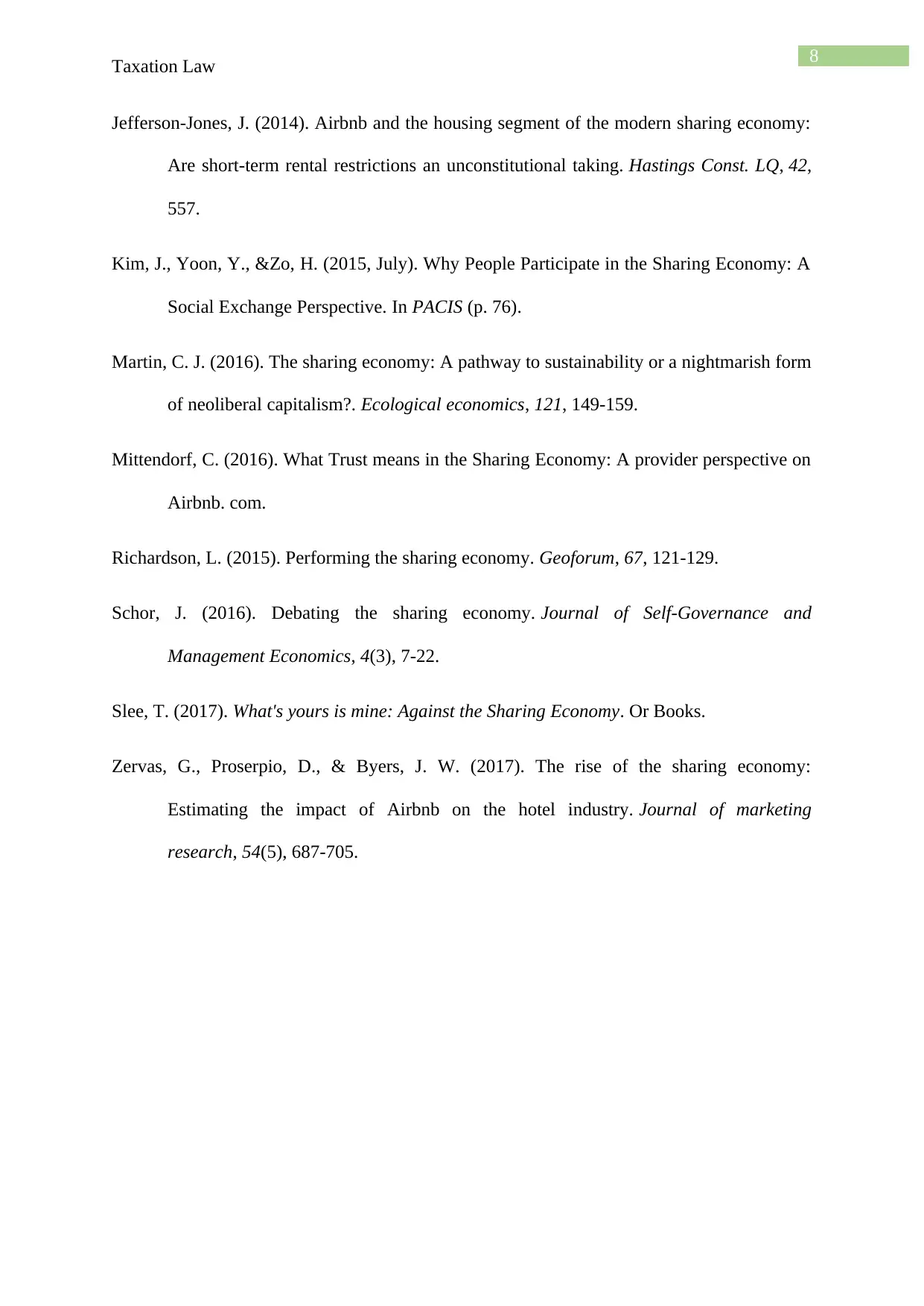
8
Taxation Law
Jefferson-Jones, J. (2014). Airbnb and the housing segment of the modern sharing economy:
Are short-term rental restrictions an unconstitutional taking. Hastings Const. LQ, 42,
557.
Kim, J., Yoon, Y., &Zo, H. (2015, July). Why People Participate in the Sharing Economy: A
Social Exchange Perspective. In PACIS (p. 76).
Martin, C. J. (2016). The sharing economy: A pathway to sustainability or a nightmarish form
of neoliberal capitalism?. Ecological economics, 121, 149-159.
Mittendorf, C. (2016). What Trust means in the Sharing Economy: A provider perspective on
Airbnb. com.
Richardson, L. (2015). Performing the sharing economy. Geoforum, 67, 121-129.
Schor, J. (2016). Debating the sharing economy. Journal of Self-Governance and
Management Economics, 4(3), 7-22.
Slee, T. (2017). What's yours is mine: Against the Sharing Economy. Or Books.
Zervas, G., Proserpio, D., & Byers, J. W. (2017). The rise of the sharing economy:
Estimating the impact of Airbnb on the hotel industry. Journal of marketing
research, 54(5), 687-705.
Taxation Law
Jefferson-Jones, J. (2014). Airbnb and the housing segment of the modern sharing economy:
Are short-term rental restrictions an unconstitutional taking. Hastings Const. LQ, 42,
557.
Kim, J., Yoon, Y., &Zo, H. (2015, July). Why People Participate in the Sharing Economy: A
Social Exchange Perspective. In PACIS (p. 76).
Martin, C. J. (2016). The sharing economy: A pathway to sustainability or a nightmarish form
of neoliberal capitalism?. Ecological economics, 121, 149-159.
Mittendorf, C. (2016). What Trust means in the Sharing Economy: A provider perspective on
Airbnb. com.
Richardson, L. (2015). Performing the sharing economy. Geoforum, 67, 121-129.
Schor, J. (2016). Debating the sharing economy. Journal of Self-Governance and
Management Economics, 4(3), 7-22.
Slee, T. (2017). What's yours is mine: Against the Sharing Economy. Or Books.
Zervas, G., Proserpio, D., & Byers, J. W. (2017). The rise of the sharing economy:
Estimating the impact of Airbnb on the hotel industry. Journal of marketing
research, 54(5), 687-705.
⊘ This is a preview!⊘
Do you want full access?
Subscribe today to unlock all pages.

Trusted by 1+ million students worldwide
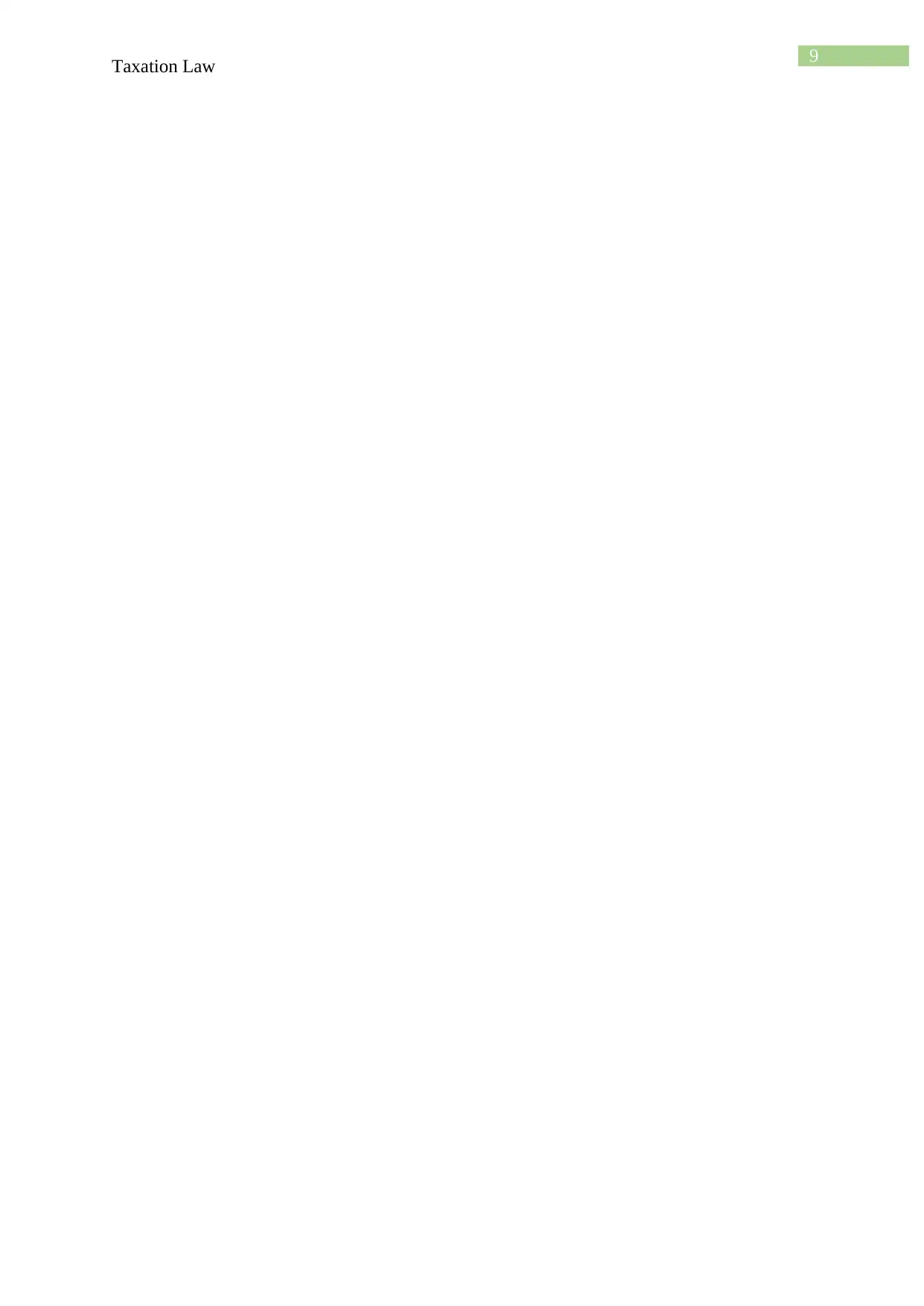
9
Taxation Law
Taxation Law
1 out of 10
Related Documents
Your All-in-One AI-Powered Toolkit for Academic Success.
+13062052269
info@desklib.com
Available 24*7 on WhatsApp / Email
![[object Object]](/_next/static/media/star-bottom.7253800d.svg)
Unlock your academic potential
Copyright © 2020–2026 A2Z Services. All Rights Reserved. Developed and managed by ZUCOL.





